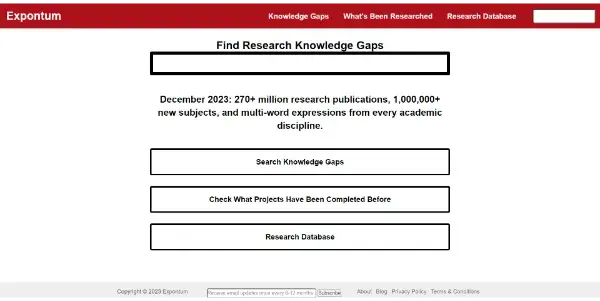Expontum

Quickly identify knowledge gaps and research already carried out in all academic fields. Works with the help of specialized AI
Expontum: A Free AI Tool for Rapid Knowledge Gap Identification
Expontum is a revolutionary Research Intelligence Platform (RIP) AI tool designed to significantly accelerate the research process across all academic disciplines. Leveraging the power of specialized AI, it allows researchers to quickly identify existing knowledge gaps and locate relevant prior research, saving valuable time and resources. This article delves into its functionality, features, applications, and comparative analysis.
What Expontum Does
Expontum's core function is to streamline the literature review phase of research. It efficiently analyzes vast quantities of academic data to pinpoint areas where further investigation is needed. This involves identifying unexplored topics, contradictions in existing research, and potential avenues for innovation within a specific field. Instead of manually sifting through countless papers and databases, researchers can utilize Expontum to gain a comprehensive overview of the current state of knowledge and quickly pinpoint research gaps.
Main Features and Benefits
- Rapid Knowledge Gap Identification: The tool's AI algorithms swiftly analyze research papers, identifying unexplored areas and inconsistencies within the existing body of knowledge.
- Comprehensive Literature Review Support: Expontum helps researchers efficiently locate relevant pre-existing research, minimizing the time spent on manual literature searches.
- Cross-Disciplinary Applicability: The tool's functionality spans across all academic fields, making it a versatile resource for researchers in diverse disciplines.
- Time Savings: By automating the process of identifying knowledge gaps and relevant literature, Expontum frees up researchers' time, allowing them to focus on analysis and experimentation.
- Improved Research Efficiency: The tool enables researchers to formulate more focused research questions and design more impactful studies.
- Enhanced Research Quality: By providing a more complete understanding of the existing literature, Expontum contributes to higher quality research outputs.
Use Cases and Applications
Expontum finds application in a wide range of research contexts, including:
- PhD Candidates: Quickly identify relevant literature and potential dissertation topics, pinpointing unexplored areas within their chosen field.
- Postdoctoral Researchers: Efficiently navigate existing research to identify gaps and formulate novel research questions.
- Faculty Members: Identify areas for collaboration and grant applications based on identified research gaps.
- Industry Researchers: Streamline the literature review process for product development and innovation.
- Systematic Reviewers: Identify relevant studies for inclusion in systematic reviews and meta-analyses.
Comparison to Similar Tools
While several tools offer literature searching capabilities, Expontum differentiates itself by its primary focus on knowledge gap identification. Many existing tools primarily focus on retrieving relevant papers based on keywords, while Expontum goes a step further by analyzing the relationships between papers and identifying unexplored areas. A direct comparison to specific competitors requires knowing the specific features of those tools, but Expontum aims to provide a more sophisticated and insightful analysis beyond simple keyword matching.
Pricing Information
Expontum is currently offered completely free of charge. This makes it an accessible and valuable resource for researchers at all levels and across various institutions.
Conclusion
Expontum offers a significant advancement in research methodology. By leveraging the power of AI to identify knowledge gaps and relevant literature, it empowers researchers to work more efficiently and effectively. Its free access further enhances its value as a readily available tool to boost research productivity across all academic disciplines. As the tool evolves, it will be interesting to see how its capabilities expand and further improve the research process.